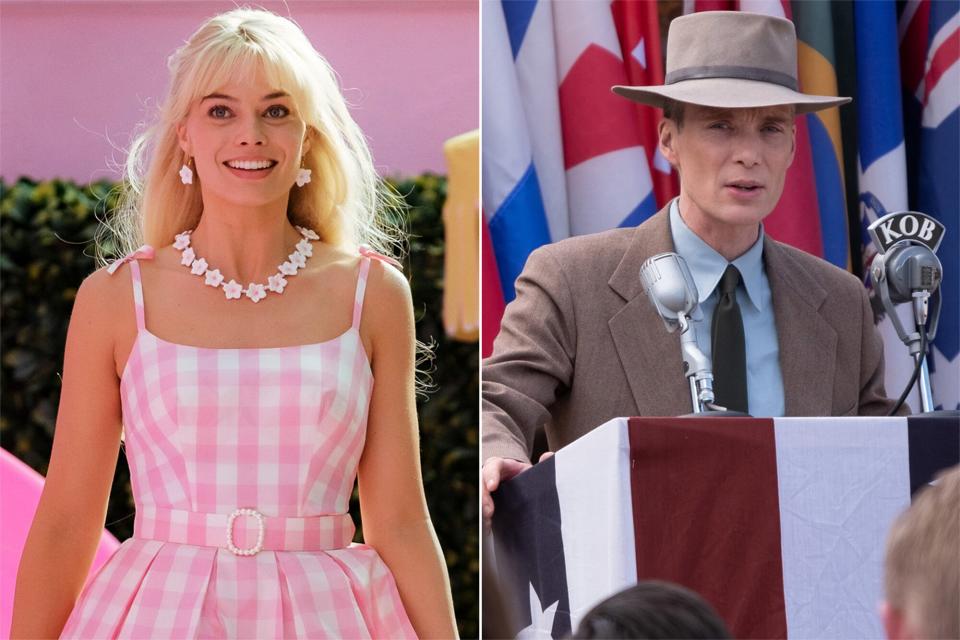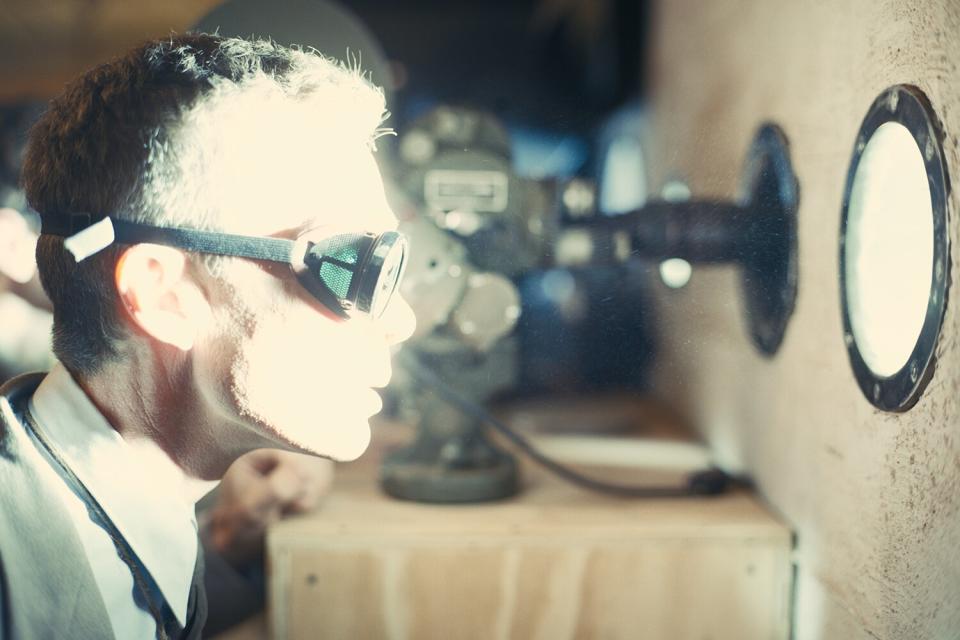Is Barbieheimer actually the perfect double feature? EW's verdict on the summer's biggest meme
- Oops!Something went wrong.Please try again later.
- Oops!Something went wrong.Please try again later.
- Oops!Something went wrong.Please try again later.
Barbieheimer has taken the world by storm. Hot pink mushroom cloud t-shirts and internet memes abound as the world waits, with bated breath, for July 21.
Through the power of social media, the simple notion of Hollywood counter-programming has turned into a veritable phenomenon this summer. The shared release date of feminist daydream Barbie and expansive biopic Oppenheimer are creating a moment of hot pink box-office fusion. But now that it's finally here, should you actually do a Barbie-Oppenheimer double feature, even if more than 200,000 moviegoers already purchased tickets to do so? EW offers the results of our own investigation into the matter.
First off, please, absolutely see both movies. In a theater. On the biggest screen possible. Because they're worth the theatrical experience. But also we have the power in a single weekend to send Hollywood the message that movies like this — moviegoing events and fresh, original filmmaking — are what audiences want more of (a particularly important message to send studios amidst ongoing labor disputes).
Compare and contrast

Jaap Buitendijk/Warner Bros.; Melinda Sue Gordon/Universal Pictures
Barbie and Oppenheimer are shining examples of the ingenuity and creativity of two sublime writer-directors, Greta Gerwig and Christopher Nolan. One of these movies is a subversive look at the damage wrought by the patriarchy, as well as an existential meditation on what it means to be human and the ways our own mortality can bestow meaning in our lives. The other is a biographical account of the life of J. Robert Oppenheimer.
All tongue-in-cheek quipping aside, the two films actually share many parallels, if entirely different approaches. Barbie and Oppenheimer are complementary experiences, their disparate trappings belying their shared themes and goals.
Barbie follows stereotypical Barbie (Margot Robbie) as she blithely enjoys the plastic paradise of Barbieland, where life is perfect and Ken (Ryan Gosling) exists purely to be appreciated by Barbie. But when "irrepressible thoughts of death" send Barbie and Ken to our world to restore Barbie's bliss as an aspirational plaything, Barbie is shocked to discover that the feminist hallmarks of her world are flipped on their head. Her journey (and Ken's own descent into the temptations of the patriarchy and toxic masculinity) leads her to understand the juxtaposition between what Barbie stands for and the ways in which she's been twisted by the very system that created her. Barbie exists at the crossroads of the tension between creativity and commerce.
Oppenheimer faces a different crossroads, a taut ideological war between theory and practice, science and politics. It is aggressively less linear in its storytelling than Barbie, as it follows the adult life of physicist and father of the atomic bomb, J. Robert Oppenheimer (Cillian Murphy) told in parallel to the Senate confirmation hearings of Admiral Lewis Strauss (Robert Downey Jr.). Oppenheimer weaves in and out of the title character's own hearings before the Atomic Energy Commission's Personnel Security Board as he recounts his days as a physics student abroad, his time at UC Berkeley, and the complex efforts of the Manhattan Project. It could play as a standard biopic, but Nolan has ensured it is anything but, in the ways he employs sound, image, and music to deconstruct an American hero. Nolan innately understands film as both a visual and aural medium, ratcheting up tension via their interplay.
Both films are about interrogating American icons, the cognitive dissonance of their aims and their existence. While Barbie believes she's a force for showing little girls that they can be anything, she learns that she's often a means of reinforcing sexist gender expectations. Oppenheimer hopes creating an atomic bomb will usher in a new age of peace instead of the arms race he ignites (or as he puts it, a chain reaction that will destroy the world).

Universal Pictures Cillian Murphy in 'Oppenheimer'
Both Barbie and Oppenheimer have to grapple with their perceived intent and their reality, the world's blurring of their noble goals for morally suspect ends. And both, fittingly, think a lot about death — or perhaps, more aptly, mortality. While Barbie discovers that mortality and human complexity are what give life meaning, Oppenheimer wrestles with legacy and the ways in which creating a weapon of mass destruction informs his own. Barbie embraces humanity in all its chaos, while Oppenheimer confronts the fear that he has given humans the keys to their own destruction because of that very same chaos.
The films indict the patriarchy and the ways in which its systemic injustices and arrogance inform capitalism (Barbie) and patriotism (Oppenheimer). While Barbie names its interrogation of the patriarchy explicitly in its meta approach, Oppenheimer makes its own commentary implicit in its star-studded, heavily male cast and the backroom boys-club politics of everything from a physics laboratory to the Atomic Energy Commission to the Oval Office. With a creeping sense of existential dread, Gerwig and Nolan expose the underbelly of the systems that built Barbie and the atomic bomb. Barbie plays it mostly for satire, while Oppenheimer puts all its chips on grim realism.
They differ in their conclusions — with Barbie celebrating human messiness as an essential part of life's joy and Oppenheimer serving as a bleak cautionary tale. Gerwig is the Rousseau of summer movies, while Nolan is the Hobbes, though neither is perhaps as nihilistic as their movie's trailers might lead you to believe.
The movies are subversive in the ways they ask us to unpack our own choices, expectations, and contradictions through the lens of American ingenuity and commerce. Barbie and Oppenheimer are symbols, yes, but they're much more complicated and contradictory than the reductive, metaphorical box of such a status. Barbie and Oppenheimer, the films, invite audiences to explode that box to probe deeper truths about our systems, our morality, and our humanity — and they have surprisingly similar things to say, even if they draw different conclusions.
The verdict

Courtesy Warner Bros. Pictures Margot Robbie in 'Barbie'
All of this being said, we'd recommend you make a weekend of the Barbieheimer phenomenon. Both of these films are heady experiences that will leave a lot to ponder long after the final reel. Give yourself the breathing room to honor each as its own achievement rather than trying to shove both into a single double-feature day for the sake of a meme. Though, if you must, we stand by popular advice to do Oppenheimer first and Barbie second so that you can end the day on a more optimistic note. (Take it from this writer's Oppenheimer-induced insomnia.)
We can hear you screaming, "How dare you deny me the opportunity to see Ryan Gosling's Kenergy and Cillian Murphy's cheekbones and piercing blue eyes in the space of a single day?" But trust us, you want to give each its due.
Barbie and Oppenheimer amply deserve their mutual hype, but they also deserve to be savored as individual experiences. What a gift to have two massive summer movies that leave audiences with so much to unpack, ruminate on, and, yes, enjoy. While they're both bursting with dynamic ideas and philosophical quandaries, they also offer a sense of wonder and joy at the power and possibilities of cinema.
In a summer where franchise entries have disappointed at the box office, it's exciting to have two such fresh, visionary projects out on the same day. Barbie and Oppenheimer are a match made in movie heaven and the explosive reaction to their shared release date is thrilling. But the bombshell and the bomb both have a hefty blast radius, and audiences should let themselves find their footing in between their screenings to fully maximize their impact.
Want more movie news? Sign up for Entertainment Weekly's free newsletter to get the latest trailers, celebrity interviews, film reviews, and more.
Related content:

